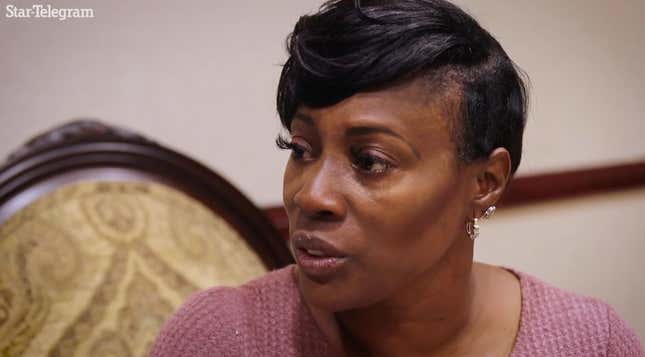
Crystal Mason, sentenced to five years in prison for casting an illegal ballot, had her appeal denied by a Texas judge last week.
As the Texas Tribune reports, on Thursday, a three-judge appellate panel affirmed Mason’s conviction for casting an illegal ballot in the 2016 presidential election. Mason, who was on probation for a federal conviction related to tax fraud, wasn’t aware that Texas state law prohibited her from voting. On the advice of a poll worker, Mason cast a provisional ballot—a method of voting used when there are questions about a person’s voting eligibility.
Mason’s vote was never counted, but she was still found guilty—and given a hefty sentence—for casting that ballot. But according to the appellate judges, even if she was specifically never told about her voting eligibility, knowing that she was on probation should have been enough to discourage her from going to the voting booth that day.
“The fact that she did not know she was legally ineligible to vote was irrelevant to her prosecution,” Justice Wade Birdwell wrote on behalf of the court. “The State needed only to prove that she voted while knowing of the existence of the condition that made her ineligible.”
“Although Mason may not have known with certainty that being on supervised release as part of her federal conviction made her ineligible to vote under Texas law or that so voting is a crime…she voted anyway, signing a form affirming her eligibility in the process despite the fact that she was not certain,” the judge continued.
Mason has become a voting rights advocate in recent years following the controversial conviction, which was handed down in 2017. The simple mistake upended Mason’s life, as the Guardian illustrates:
The case has already taken a significant toll on Mason, who turns 45 on Saturday. After she was arrested in 2017, the life she had been working to rebuild since getting out of federal prison in 2015 crumbled. She lost her job, which provided the main source of income for her family, which includes three children, four of her brother’s children who she raised, and her grandchildren.
Because she was convicted of illegal voting while on supervised release, a federal judge had also sent her back to federal prison in late 2018, where she served several months. Her teenage daughter Taylor put off going to college to come home and run the household. The family depended in part on donations from a GoFundMe account.
Mason’s supporters, including voting rights advocates, warn that the ruling could have effects that reach far beyond Mason and her family.
“This ruling is a severe misinterpretation of the law,” said Alison Grinter, the criminal defense attorney for Crystal Mason. “It undercuts efforts to encourage voter turnout through the Help America Vote Act and punishes ordinary voters for attempting to fulfill their civic duty in a way that is at complete odds with our democratic principles.”
Mason herself has become an activist: released from federal prison last July, she hosted a “welcome home” party that had a voter registration table.
Each state is responsible for crafting their own laws concerning voting eligibility for those convicted of crimes. Mason says she was unaware that her supervised release meant that she was still ineligible. According to her, no one—not the federal court, not her supervision officer, and not the election worker helping her fill her ballot—told her it was illegal for her to vote.
Mason’s lawyers plan to ask the full appeals court to rehear the case, the Tribune reports. If they are still unsuccessful in overturning her conviction, the case would then go up to Texas’s highest criminal court, the court of criminal appeals. From there, the case may go up to the Supreme Court for consideration.
Central to Mason’s case is whether a vote is cast illegally if it’s not counted—and what the ultimate purpose of the provisional ballot ought to be.
Provisional ballots have been around for almost 20 years, and function as a safeguard for folks who may be ineligible to vote but want to have their ballot counted just in case. As the Tribune notes, “tens of thousands of provisional ballots are cast in large elections, and most are rejected.”
In fact, according to The Guardian, more than 12,000 people have used a provisional ballot in Tarrant County, the place Mason cast her vote, since 2014. Of that number, 88 percent were rejected because the voter was not eligible—but only Mason has been prosecuted for illegal voting.
In a statement released Friday by her lawyers and shared by the Fort Worth Star-Telegram, Mason said she believed, with the help of her family and God, that “right will prevail.”
“A punishment of five years in jail for doing what I thought was my civic duty, and just as I was getting my family’s life together, is not simply unfair,” she wrote, “it’s a tragedy.”

